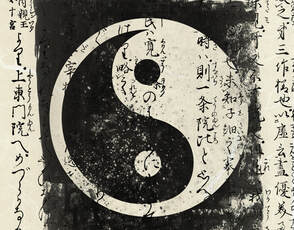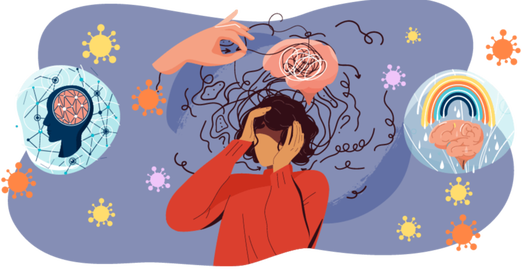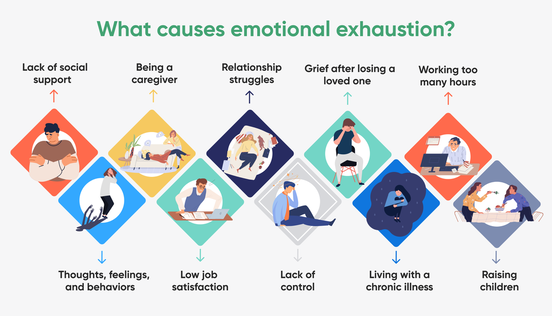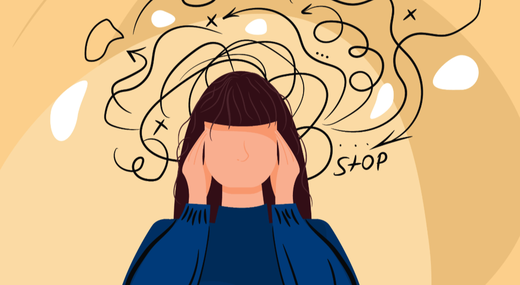Like any other physical health issue, anxiety has symptoms and those symptoms have an effect on the physical body as well. Fear is a basic biological process of an alarm that tells you something isn't right. It's a deep concern, a sense in your gut, or a full 5 alarm fire in the case of a physical threat, an emergency in which quick action is required to avoid harm to yourself or others. It overrides the rational mind. The amygdala fires up, sending chemical messages to your frontal lobe, rational thinking becomes impaired by this arousal to take action. Adrenal pumps to empower you to take action. After it's over, your body unwinds with the help of the reptilian brain/limbic system and the whole thing passes, your body returns to normal and it's over. Arousal of fear is a natural function of the sensory body whose purpose is to alert you of danger or potential for danger. In this way your brain can get out of the way so that you are able to move and take action without thinking about it. In the same way a Ninja or martial arts master is able to respond to threats with a defensive action that removes themselves or others from danger or subdues an attacker. This alert / alarm allows us to be empowered to avoid or overcome a situation that is dangerous, emotionally harmful or overly challenging to us. However, the driver of the "anxiety mobile" in the case of generalized anxiety that does not appear to be in response to any immediate physical threat, is fearfulness. This form of fear is immobilizing leading to the "freeze response" or adrenal driven "fight or flight". Protracted freeze response numbs one out making your feelings, your guidance system, unavailable to you. This is depression. Fight or flight unchecked is anxiety. The feeling is, you need to run, but there is nowhere to go...so you run in your mind instead! Beyond the normal function of arousal we can become victimized by our own thoughts and worries, falling into a acute or chronic state of fearfulness. The energy of thoughts and worries is powerful and can make us believe things that are not real...irrational thinking. It also charges up our body with stress hormones and neurotransmitters that flood the system and literally make you feel ill. This cascade of stress leads to insomnia, fatigue, malaise, depression, digestive disorders, panic state, fluctuations in blood sugar. Anxiety can become debilitating to the extreme. The medical profession's preferred way of treating anxiety is with medications for which they are substantially rewarded financially by drug companies. Treatment usually involves a combination of antidepressants and tranquilizers... Serotonin uptake inhibitors and benzodiazepines. In some cases of serious depression and debilitating anxiety a short term use of the medications may be helpful. But, the down side of these medications is a slippery slope that ultimately leads to more compounded health issues. The failure of medications points toward the need to work with the symptom rather than suppress it. As in the case of most healing, working with a symptom may mean taking time off to rest, to reflect, making space for recovery. This does not work well in our modern society that wants everybody to be productive all the time. Unfortunately, we pay a bigger price in the end for not taking care when symptoms arise. More about the dangers of antidepressants. More about the dangers of benzodiazepines.  In the framework of Taoist medicine, we are equipped to look at the manifestation of symptoms based on the energetic expression. Often depression and anxiety go hand-in-hand. We begin by understanding that we feel the way we do for a good reason. This point is missed by modern medicine which seeks to fix the symptom rather than arrive at the root cause of the of the symptom as an energetic expression. Depression and anxiety can be considered the mental equivalent of irritable bowel syndrome/chronic constipation. Cycling between running and freezing and going nowhere! Let's look at both of these from an energetic point of view. Depression from an energetics perspective is often brought on by feelings of frustration and anger housed in the liver/gallbladder. Depression is a variation of hopelessness. Hopelessness is a dangerous place to be. It creates thought patterns that lead us down into a pit of depression, which naturally arises when we do not believe there is anything that we can do to change our situation. Depression can develop suddenly or gradually over a period of time. Anxiety ensues as the depressed person feels life is slipping away from them. Medical professionals often hook into this fear and recommend medications as though this is not a natural state one may find themselves in. Anxiety and depression can mask other emotions. Those prone to anxiety and depression often have trouble discerning other feelings besides anxiety. Emotions like hurt, anger, sadness, etc. are inaccessible. It is the inability to digest these difficult emotions that results in the internalized tension that fuels anxiety and depression. Anxiety is a complex experience relating to fear whose home is in the heart. It can be fleeting, easy to recognize and relatively easy to deal with. But, it can become chronic, and in much the same way a chronic disease like cancer. Anxiety can spread anxiety over your life like a sticky layer of cotton candy that seems impossible to escape. Chronic anxiety also tends to sneak up on us. Modern medicine tells us that chronic anxiety is irrational thinking and that all we need to do is change the way we think, cognitive behavioural therapy or take the magic pill, benzodiazepines and/or antidepressants. Working holistically it is important to minister to the spiritual self, the physical body, as well as the mind when dealing with anxiety and depression. Changing the thought patterns of irrational thinking means that we need to take a deeper dive into the source of the irrational thinking, fear. Paying attention to what the fear voice in your head is saying, is helpful in reversing anxiety. Understanding how we fall into irrational thinking can help us to learn to recognize it, which is the key to overcoming the incessant messages. Here are some general tendencies that relate to forms of anxiety
Anxiety often goes hand-in-hand with exhaustion, as does depression. When we are exhausted, everything seems too big. Anxiety makes everything important. Anxiety makes it difficult to see and set priorities. What to make for dinner can feel just as important as preparing for that job interview. This is why it is easy to feel overwhelmed—so much to do, so little time. It's almost like having a choir of voices in your head, emphasizing that every single topic is equally important. The upshot of this mental activity is a feeling of deficiency. When you're exhausted, that's the last thing you need to hear is that you should be doing more. Those who lean towards perfectionism are particularly susceptible to anxiety. The driver of perfectionism is a foil for self doubt, it adds fuel to the fire making everything seems bigger and more problematic. Perfectionism is a liar. Here are some techniques to help you recognize and deal with anxiety.
Anxiety Rx's - What to do to alleviate anxiety episodes.
* Crucial information for benzodiazepine and antidepressant users. You are advised not to take these types of supports and certain foods as they can alter the function of medication, create a withdrawal state or kindle withdrawal symptoms. For more information visit the Benzodiazepine Coalition Information website. Antidepressant nutritional interactions report. Emergency Rx's for high level/panic attacks
Moving forward toward healing....
As you move forward supporting the physical body and are becoming more aware of what your anxiety centers on you can gradually start to take risks. Move towards what you fear. In the process you will come to realize anxiety is just a state of being...it's not who you are. You can experience it without becoming it. In this way you eventually won't be derailed by it! You want to desensitize yourself to the feeling of anxiety by deliberately doing things that go against your grain, by approaching rather than avoiding what makes you anxious. Taking risks and stepping outside your comfort zone will expand your world rather than making it smaller. Improving your self-confidence and self-esteem will moving you forward and out of anxiety. These positive experiences open you up to self empowerment and everything will begin to shift with this improved sense of self. You will be less frightened and fearful expanding into a feeling of safety builds trust and trust opens us to inner strength. We trust what we feel, we can use our feelings for their intended purpose, to guide us. We can mature out of feelings that don't serve us at any age! Bridge to Health offers Wellness Support to assist recovery from chronic or acute stress and anxiety.
0 Comments
|
VanessaCertified Wellness Consultant speaks up! Categories
All
Archives
June 2024
|
|||||||||
BRIDGE TO HEALTH
|
Bridge to Health Wellness
Awaken & Evolve Learning Center 7610 East McDonald Drive, Suites E & K Scottsdale, AZ 85250 805-235-8071 |
LinkTree - Find all our links here!
Booking Site - Social - YouTube Schedule Your Learn & Heal Consult Become a client Email: Bridge to Health Wellness |



 RSS Feed
RSS Feed